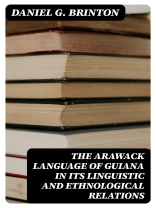In ’The Arawack Language of Guiana in its Linguistic and Ethnological Relations, ’ Daniel G. Brinton delves into the intricate linguistic structures and cultural contexts of the Arawak languages across the Guiana region. This seminal work combines rigorous linguistic analysis with ethnographical observations, offering a comprehensive study that not only examines the grammar and vocabulary of these indigenous languages but also situates them within the broader anthropological landscape of the Americas. Brinton adopts a meticulous scholarly style, employing a comparative methodology that reveals the interplay between language and indigenous cultural identity, while also addressing the socio-historical factors impacting these communities. Daniel G. Brinton, an esteemed linguist and anthropologist of the 19th century, was profoundly influenced by his commitment to the preservation of indigenous cultures amidst the colonial pressures of his time. His extensive travels and interactions with various indigenous groups informed his academic pursuits, culminating in this pivotal work that highlights the significance of language as a repository of cultural heritage. Brinton’s multidisciplinary approach exemplifies the intersection of linguistics and anthropology, showcasing his belief in the interconnectedness of language, culture, and societal structures. For scholars, anthropologists, and linguists alike, ’The Arawack Language of Guiana in its Linguistic and Ethnological Relations’ is an indispensable addition to the study of indigenous languages and cultural preservation. Brinton’s groundbreaking insights serve as both a historical reference and a methodological guide for contemporary investigations into the rich tapestry of linguistic diversity in South America. It is a must-read for anyone interested in the profound relationship between language and the cultures it embodies.
Om författaren
Daniel Garrison Brinton (1837-1899) was a prominent American archaeologist, ethnologist, and linguist, known for his scholarly contributions to the understanding of the indigenous peoples of the Americas. An influential figure in the field during the 19th century, Brinton was particularly interested in Native American languages and cultures. He was born in Thornbury Township, Pennsylvania, and pursued an education in medicine at Yale University, though his passion for anthropology and linguistics directed his professional life. One of his significant works includes ’The Arawack Language of Guiana in its Linguistic and Ethnological Relations’ (1871), which offers an in-depth analysis of the Arawak language and its connections to other indigenous languages and cultures. Brinton’s work was pioneering in that it not only described the linguistic aspects but also connected them with ethnological studies, advocating for a holistic approach to understanding indigenous societies. His literary style combined meticulous research with a deep respect for the cultures he studied. Brinton’s contributions are remarkable for their time, as he was one of the few scholars who posited that the indigenous languages of the Americas held as much complexity and significance as the classical languages of Europe. Through his career, he held various academic positions, including the professorship of Ethnology and Archaeology at the Academy of Natural Sciences in Philadelphia. Brinton’s legacy endures through his numerous publications that continue to serve as valuable resources for researchers in the fields of linguistics and anthropological studies of Native American peoples.












